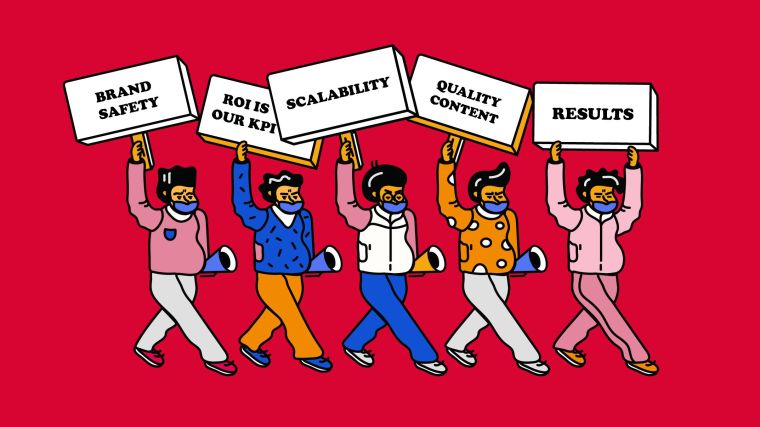
For years, brand safety has been a mounting issue for marketers cautious about media placements and appearing alongside content that could negatively affect their brands.
Recently, that conversation has reached a crescendo with holding company Dentsu at the helm, developing tools and a new set of standards to push the industry past quick and easy brand safety fixes into a new long term solution: brand integrity.
“We wanted to show our clients that we’re about more than just contextual brand safety,” said Olga O’Donnell, head of Dentsu international’s newly launched brand safety team, who spoke at Digiday’s Media Buying Summit (DMBS).
Dentsu’s Mission: Create a brand safety team that would tackle ‘brand integrity’
Brand safety was already a hot topic, top of mind for many marketers as more players entered the digital media arena. In years prior, O’Donnell says, brands were complacent, with ads appearing beside questionable or harmful content. Clients deemed brand safety and fraud protection as “tactical and remedial,” she said.
That has quickly changed since last year’s global pandemic and social justice movements pushed adland into accountability.
“Many brands are now looking inwardly to reconfirm and reassess their core values,” O’Donnell said. “Now, brands want to invest with partners that understand and support their values. They want to be more mindful — not only on what they don’t want to support, but specifically who they actually want to support with investments.”
What Dentsu’s brand safety team has done is taken a loose company-by-company approach and created an agency level brand assurance framework, per O’Donnell.
“In addition to best practices for ad verification, we also advocate for the promotion of buying principles that align investment with premium vetted environments for better business outcomes,” she said.
That’s not to say that the holding company takes a one-size-fits-all approach. There’s flexibility at the client team level, in collaboration with the client, in which Dentsu leverages ongoing team communication, information sharing and crisis management, she said during the summit.
The work happens in partnership with the Global Alliance for Responsible Media (GARM), which launched in 2019 to address the challenge of harmful content on digital media platforms and its monetization via advertising, per the GARM website.
“Really, it’s a centralized collection of best practices for digital ad safety with the goal to deliver value,” she said. “It’s a strategic approach to digital ad safety that ensures a baseline of consistency.”
Globally, Dentsu clients are actively leaning into the idea of brand safety, per O’Donnell, who noted that in light of 2020, brands are looking to be more purposeful about who and what their ad dollars are funding.
“We have a lot of division and discord in our society, and consumers expect brands to have a voice,” she said. “So brands need to assess their corporate and moral values, and how these values translate into their investment strategy.”
“We truly believe that a conversation around the issues of brand safety really needs to be happening everywhere. It has to happen internally, it has to happen with partners and the industry overall,” she said.
According to O’Donnell, it’ll take an industry-wide effort and all hands on deck approach to create a framework that’ll stick as the digital media landscape continues to expand.
“Brand assurance strategy is not set it and forget it,” she said. “It requires constant reevaluation and iteration. And it requires all of the participants in the ecosystem to do this together.”


